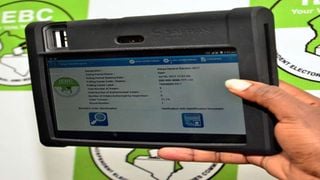
A gadget from OT-Morpho that was acquired by the Independent Electoral and Boundaries Commission (IEBC) for use in the the 2017 general elections.
| File | Francis Nderitu | Nation Media GroupNews
Premium
IEBC: We’re tied at the hip with OT Morpho
Kenya has no way of cutting ties with the controversial French firm whose system failure in the 2017 polls occasioned nullification of the Presidential election results and nearly plunged the country into chaos, the IEBC has stated.
The Independent Electoral and Boundaries Commission (IEBC), in a document justifying its push to have Idemia’s contract renewed, says it is aware of the reputational baggage that comes with using the discredited company but states it is the only viable option “because of time and costs.”
Despite not asking for quotes from other suppliers, and also pushing to be exempted from the centralised procurement of ICT equipment and services, the IEBC maintains that it would be cheaper to use Idemia’s system in the upcoming referendum than procure a new company.
"Use of existing software with minor modifications has many accrued benefits including reduced time to deploy for the system and reduced cost as compared to developing a new system from scratch," says the IEBC acting ICT Director Silas Njeru in the document dated November 24, and reviewed by the IEBC boss Marjan Hussein Marjan.
The IEBC’s procurement department did not respond to our requests for comment on the intention to renew Idemia’s contract despite the company’s past reputation.
Ultimate responsibility
The Treasury Secretary Ukur Yatani, whose advice on whether to renew the Idemia contract IEBC has sought, in an interview on Tuesday said the polls agency’s procurement department bears ultimate responsibility on the matter.
Previously known as Safran Morpho Limited, and later OT-Morpho, Idemia is the company that supplied IEBC with the Kenya Integrated Elections Management System (KIEMS) that was to be used to verify the voters' list before the election and later authenticate the voters with their fingerprints and photos before being allowed to vote.
The supplied Biometric Voter Registration (BVR) kits failed on election day, and was one of the basis that the Supreme Court relied on to nullify the presidential results.
The National Assembly later passed a recommendation barring the company from doing business in Kenya for 10 years “for violating the Companies Act,” but the High Court overturned the ban in May this year.
The IEBC document says there are benefits of finding a new supplier through competitive procurement, but still ends up recommending usage of the discredited company.
"There will be opportunity for competitive procurement that will change public perception on transparency of procured systems… the Commission will avoid reputation and the baggage associated with engaging Idemia," the document titled elections technology for referendum reads.
The electoral agency cites high costs, integration, data migration challenges and “time constraints” as the main reasons it wants to retain the company.
It also argues that failing to renew Idemia’s existing contract, which expires on January 7, 2021, “would be a major risk as it threatens effective deployment of technology in the conduct of the upcoming referendum and by-elections.”
"In addition, the Commission does not have a support and maintenance contract for the KIEMS that covers identification, candidate registration and results transmission system,” the document says.
Blacklisted
Idemia, headquartered in Courbevoie, France, has rebranded itself several times having been blacklisted in Nigeria, Zambia and Canada. Parliament barred it from doing business in Kenya for one decade for having 'interfered in the last two elections and violated the Companies Act.
The other revelation in the document is that despite significant expenditure on the French firm to procure and maintain the existing system, the elections body will still use the manual transmission for the referendum results.
The technical team notes that there is a possibility of the Commission opting for electronic results transmission, which will mean additional costs that require careful consideration. This, it says, is especially important with regards to the pending matter that emerged in the 2017 general election regarding the legal definition of what is results and what needs to be transmitted.
"The directorate of ICT therefore proposes the manual transmission of referendum results as implemented by the Commission during the Fresh Presidential Elections on 26th October 2017 and all the by elections thereafter," the document notes.
"Using this mode of results transmission would require the presiding officers to travel to the constituency tallying centres and deliver results to the returning officers who would then consolidate all the results and then deliver to the National Tallying Centre." IEBC recommends this manual model on grounds that it has so far not been contested by any candidates or political party.
The Idemia technology supplied to the IEBC includes Biometric Voter Registration (BVR), voter identification, candidates registration management, and results transmission system.

Late IEBC Manager Business Systems Chris Musando (right) and then Safrom Morpho Technician Pamela Owitti confer with before making a presentation to media on how devices acquired by the commission will be integrated into the Kenya Integrated Election Management Systems to monitor and disperse election results at IEBC offices on July 6, 2017.
The BVR system was acquired in the year 2012 through a government-to-government arrangement, and IEBC says it has so far been used in the registration of 19.6 million. The biometric details captured by the system includes ten fingerprints and facial images. IEBC has a BVR support and maintenance service level agreement with Idemia.
Idemia has successively bagged multi-billion shilling tenders under the Jubilee administration.
Besides the polls contracts, it was hired to supply 31,500 biometric kits for the Huduma Namba registration.





